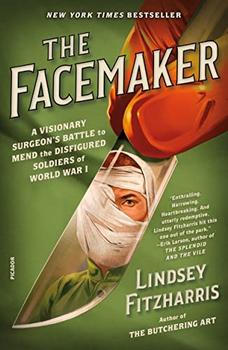Summary | Excerpt | Reviews | Beyond the Book | Readalikes | Genres & Themes | Author Bio

A Visionary Surgeon's Battle to Mend the Disfigured Soldiers of World War I
by Lindsey Fitzharris
In spite of his rebellious spirit, Gillies had an orderly mind with an affinity for rules and boundaries—especially if he was the one setting them. For the duration of his studies, he lived in a Victorian terraced house with five other young men. As students are wont to do, they came and went as they pleased. Gillies noticed that not every housemate was present at mealtimes, so he devised a system to keep track of costs. Each person was required to mark down his attendance at meals in addition to the number of "units" he consumed, as well as the cost per unit. One of his fellow lodgers called it a "most original and ingenious scheme" that ensured equity and helped keep costs down for everyone. But his mates were less impressed when Gillies charged each of them interest on money that they owed him after he had settled a household debt. For Gillies, fairness was all.
It was during his studies that he developed a serious interest in golf, routinely swapping his pen for a hickory-shafted driver. He tried out for the university's golf team on a whim after traveling to Sandwich for a party with some classmates. He had brought his golf clubs with him so that he could play a round on the famous course there, where a match between Cambridge and Oxford was going to be held a few days later. After the party was over, Gillies boarded a return train. At the last second, he had a change of heart. He grabbed his clubs and hopped off the carriage just as the locomotive began steaming out of the station. Shortly afterward, he was welcomed onto Cambridge University's golf team.
Gillies spent an inordinate amount of time locked away in the bathroom, which must have raised a few eyebrows among his housemates. His daily ritual in the tiny room was to plant his feet on the same two patches of linoleum and practice his swing in front of the mirror. His friend Norman Jewson, who would later become a famous architect, was struck by Gillies's "immense powers of concentration, and will power." Those who knew him described his talent for golf as "supernatural." In time, his patients would come to see his skill as a plastic surgeon in a similar light.
As the years passed and his studies progressed, Gillies began to display an aptitude for surgery—which was not surprising, given his obsessive attention to detail. He was driven in a way many young men of his social class were not, often sequestering himself in a library while his peers were out socializing. One friend remarked, "Whatever he decided to do he did." His determination would serve him well in life.
This was never truer than when it came to matters of the heart. Although Gillies had vowed never to marry a nurse, he found himself suddenly and hopelessly in love with Kathleen Margaret Jackson, a nurse at St. Bartholomew's Hospital, where Gillies had been working during his clinical studies. But there was a problem: another doctor was also courting her.
Never one to shy away from a little competition, Gillies redoubled his efforts. One evening, he hired a hansom cab and invited Kathleen out for a ride. Once in the buggy, Gillies had the cabbie drive them continuously through the streets until she accepted his proposal. The stern etiquette of the day required that nurses live on hospital grounds and remain unmarried, so Kathleen resigned from her job shortly after becoming engaged. The two were happily married six months later on November 9, 1911. By then, Gillies was ensconced in his lucrative position at Rees's private medical practice.
It was with his wife, Kathleen, that Gillies was attending the performance of Aida in Covent Garden's grandly porticoed opera house on that pleasant spring night. The couple had left their firstborn— a little boy named John who would become a POW during the Second World War when his Spitfire was shot down over France—in the care of family. As the curtain fell on the opera's first act, a white-gloved attendant approached Gillies discreetly and requested his presence backstage. Given the habitually light duties of his boss on these occasions, Gillies expected to have to do little more than spray some sort of soothing balm into the overworked throat of a singer. Instead, he found one of the dancers injured and in a state of undress. Felyne Verbist, the Belgian prima ballerina, had sat on a pair of scissors, sustaining a deep puncture wound to her shapely backside. Gillies set to work bandaging the tender spot.
Excerpted from The Facemaker by Lindsey Fitzharris. Copyright © 2022 by Lindsey Fitzharris. Excerpted by permission of Farrar, Straus & Giroux. All rights reserved. No part of this excerpt may be reproduced or reprinted without permission in writing from the publisher.
Your guide toexceptional books
BookBrowse seeks out and recommends the best in contemporary fiction and nonfiction—books that not only engage and entertain but also deepen our understanding of ourselves and the world around us.